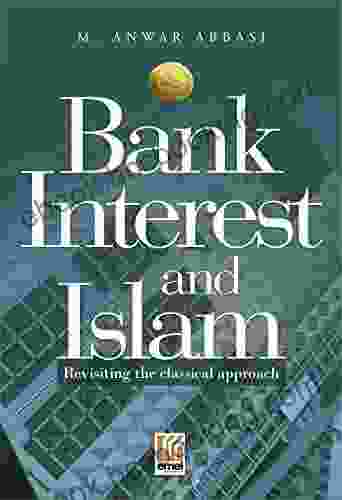Bank Interest and Islam: Revisiting the Classical Approach

The intersection of bank interest and Islam has ignited a profound debate that has shaped Islamic finance for centuries. This article embarks on an in-depth exploration of the classical scholarly interpretations of interest, examining the arguments both in favor and against its permissibility within the Islamic framework. By shedding light on this complex and evolving issue, we aim to illuminate the significance of this debate and its enduring impact on the development of modern Islamic finance.
5 out of 5
| Language | : | English |
| File size | : | 1320 KB |
| Text-to-Speech | : | Enabled |
| Screen Reader | : | Supported |
| Enhanced typesetting | : | Enabled |
| Word Wise | : | Enabled |
| Print length | : | 195 pages |
| Lending | : | Enabled |
The Prohibition of Riba
At the heart of the debate lies the concept of "riba," a term that encompasses interest, usury, and any form of financial gain derived from lending. The prohibition of riba is explicitly stated in the Quran and Sunnah, the two primary sources of Islamic law. The Quran unequivocally condemns riba as an oppressive and exploitative practice (2:275-279),while the Prophet Muhammad (peace be upon him) vehemently denounced it in numerous hadiths (sayings and actions).
Classical Interpretations of Riba
Classical Islamic scholars engaged in extensive discussions and debates to define riba and determine its specific manifestations. Prominent jurists such as Imam Malik, Imam Abu Hanifa, and Imam Shafi'i developed varying interpretations, leading to different schools of thought within Islamic jurisprudence.
The predominant view among these classical scholars was that riba refers to any fixed or predetermined increase in the principal amount of a loan, regardless of the purpose or duration of the loan. This interpretation is based on the understanding that riba constitutes an additional burden imposed on the borrower, violating the principle of equity and fairness in financial transactions.
Arguments Against Interest-Based Banking
Proponents of the classical prohibition of riba argue that interest-based banking systems perpetuate inequality and social injustice. They contend that interest-bearing loans create a vicious cycle of debt, where borrowers are forced to pay back more than they originally borrowed, often leading to financial hardship.
Moreover, they argue that interest-based banking violates the Islamic principle of risk-sharing. In a traditional loan, the lender bears no risk associated with the borrower's investment. However, in an interest-based loan, the lender is guaranteed a fixed return regardless of the outcome of the borrower's business venture. This, they argue, undermines the spirit of partnership and shared responsibility that should characterize financial transactions in an Islamic society.
Arguments in Favor of Interest-Based Banking
Despite the classical prohibition of riba, some scholars have argued that interest-based banking can be permissible under certain conditions. These scholars maintain that riba in the Quran and Sunnah refers specifically to excessive and exploitative interest rates, not to interest in general.
They argue that interest can serve as a legitimate compensation for the lender's time and effort in providing capital. Additionally, they contend that interest-based banking systems can facilitate economic growth and development by providing access to capital for businesses and individuals.
The Significance of the Debate
The debate over bank interest and Islam has played a pivotal role in shaping the development of modern Islamic finance. As the global economy evolved and financial markets became more complex, scholars and practitioners sought to reconcile the classical interpretations of riba with the needs of a modern society.
This led to the emergence of innovative financial instruments and products that aimed to comply with Islamic law while addressing the challenges of the modern financial system. Today, Islamic finance has become a rapidly growing industry, offering a wide range of products and services that adhere to the principles of Sharia law.
Modern Perspectives on Riba
In recent years, there has been a noticeable shift in the discourse on riba among some contemporary Islamic scholars. While acknowledging the classical prohibition of riba, these scholars argue that the concept needs to be interpreted in the context of modern economic realities.
They argue that the prohibition of riba should not be understood as a blanket ban on all forms of interest. Rather, they advocate for a nuanced approach that distinguishes between exploitative and non-exploitative forms of interest. This perspective has given rise to new discussions and debates, with some scholars proposing innovative solutions to the challenges of interest-based banking in contemporary society.
The debate over bank interest and Islam is a complex and multifaceted one that has engaged scholars and practitioners for centuries. By revisiting the classical approach to this issue, we gain a deeper understanding of the arguments and interpretations that have shaped the development of Islamic finance.
While the classical prohibition of riba remains a cornerstone of Islamic law, modern scholars continue to explore its implications in the evolving economic landscape. The ongoing discussions and debates on this topic underscore the dynamic nature of Islamic finance and its ability to adapt to the changing needs and challenges of the 21st century.
By unraveling the complexities of this debate, we not only shed light on the historical and theological foundations of Islamic finance but also pave the way for future innovation and the development of financial systems that align with both the principles of Sharia law and the requirements of modern society.
5 out of 5
| Language | : | English |
| File size | : | 1320 KB |
| Text-to-Speech | : | Enabled |
| Screen Reader | : | Supported |
| Enhanced typesetting | : | Enabled |
| Word Wise | : | Enabled |
| Print length | : | 195 pages |
| Lending | : | Enabled |
Do you want to contribute by writing guest posts on this blog?
Please contact us and send us a resume of previous articles that you have written.
 Book
Book Novel
Novel Page
Page Chapter
Chapter Text
Text Story
Story Genre
Genre Reader
Reader Library
Library Paperback
Paperback E-book
E-book Magazine
Magazine Newspaper
Newspaper Paragraph
Paragraph Sentence
Sentence Bookmark
Bookmark Shelf
Shelf Glossary
Glossary Bibliography
Bibliography Foreword
Foreword Preface
Preface Synopsis
Synopsis Annotation
Annotation Footnote
Footnote Manuscript
Manuscript Scroll
Scroll Codex
Codex Tome
Tome Bestseller
Bestseller Classics
Classics Library card
Library card Narrative
Narrative Biography
Biography Autobiography
Autobiography Memoir
Memoir Reference
Reference Encyclopedia
Encyclopedia Marshall Allen
Marshall Allen Mikhaela Ackerman
Mikhaela Ackerman Michael Baigent
Michael Baigent Luis Valdez
Luis Valdez Kindle Comixology
Kindle Comixology Michael J Foy
Michael J Foy Michele Riva
Michele Riva Randy Wayne White
Randy Wayne White Michael Matthews
Michael Matthews Reginald Tomas Lee
Reginald Tomas Lee Leo Lionni
Leo Lionni Sy Montgomery
Sy Montgomery Stephen Kurkjian
Stephen Kurkjian Wolfedale Press
Wolfedale Press Latin Travel
Latin Travel Sarah Kucera
Sarah Kucera Mary Elizabeth Roarke
Mary Elizabeth Roarke Vinay Kamath
Vinay Kamath Sasha Anawalt
Sasha Anawalt Miranda Kennedy
Miranda Kennedy
Light bulbAdvertise smarter! Our strategic ad space ensures maximum exposure. Reserve your spot today!

 Travis FosterUnveiling the Enigmatic World of Lost Cities Treasure Hunters with Nicola...
Travis FosterUnveiling the Enigmatic World of Lost Cities Treasure Hunters with Nicola... Tim ReedFollow ·17.6k
Tim ReedFollow ·17.6k Banana YoshimotoFollow ·5.6k
Banana YoshimotoFollow ·5.6k Gus HayesFollow ·14.9k
Gus HayesFollow ·14.9k Hamilton BellFollow ·18.6k
Hamilton BellFollow ·18.6k Travis FosterFollow ·7.9k
Travis FosterFollow ·7.9k Darius CoxFollow ·6.4k
Darius CoxFollow ·6.4k Gabriel MistralFollow ·6.6k
Gabriel MistralFollow ·6.6k Dan HendersonFollow ·8k
Dan HendersonFollow ·8k

 Philip Bell
Philip BellPersonal History: From the Last Imperial Dynasty to the...
By Author Name A...

 Gustavo Cox
Gustavo CoxAlexander Csoma de Kőrös: The Father of Tibetology
Alexander...

 Harvey Bell
Harvey BellUnveiling the Titanicat: Dive into the True Stories...
A Literary Voyage into the...

 José Martí
José MartíUnveiling the Festive Flavors of Christmas: A Culinary...
As the crisp winter air fills with the...
5 out of 5
| Language | : | English |
| File size | : | 1320 KB |
| Text-to-Speech | : | Enabled |
| Screen Reader | : | Supported |
| Enhanced typesetting | : | Enabled |
| Word Wise | : | Enabled |
| Print length | : | 195 pages |
| Lending | : | Enabled |














